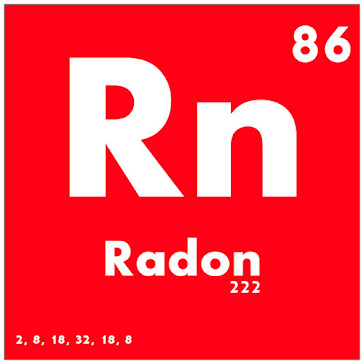It's Radon Action Month!
It’s Radon Action Month!
What's up, Forsyth?? It’s January—many of us are making New Year’s resolutions, and we hope one of those will be to test your home for radon!
Figure 1. "086 Radon - Periodic Table of Elements" by Science Activism is licensed under CC BY 2.0.
North Carolina Governor Roy Cooper has declared January 2024 as Radon Action Month. Radon is a colorless, odorless radioactive gas emitted from decaying uranium in the ground. It can make its way into homes and buildings through crawl spaces and cracks in walls and floors, and exposure can damage lung tissue and lead to lung cancer. Radon is the second leading cause of lung cancer in the US (after smoking). Radon-induced lung cancer claims an estimated 450 lives in North Carolina each year.
Unfortunately, there is no way to know if your home has high radon levels without testing. Indoor concentrations can vary widely even within neighborhoods. To decrease the risk of developing radon-induced lung cancer, the US Environmental Protection Agency (EPA) advises that steps be taken to reduce radon in your home if the results of testing show that concentrations are 4 picocuries per liter (pCi/L) or higher. Exposure to 4 pCi/L is the equivalent of smoking 8 cigarettes per day!
Typically, homes are tested for radon during real estate exchanges, but even if the concentration is below the “action level” of 4.0 pCi/L at the time of purchase, it is advisable to test again every two years, since it could change over time. While 4.0 pCi/L is a guideline for people to know when they definitely should take action, technically, there is no amount of radon gas exposure that is considered safe. Because of this, the NC Radon Program recommends that North Carolina residents consider hiring a certified radon professional to install a mitigation system for concentrations between 2.0 and 3.9 pCi/L.
Thankfully, North Carolina residents now have an opportunity to test homes for free! With the help from an EPA grant, the NC Radon Program is giving away free short-term testing kits during the month of January. These kits are limited to one per household and while supplies last.
You may also order radon test kits through the Forsyth County Office of Environmental Assistance and Protection. We have two radon specialists who are available to answer questions about radon and to assist you in obtaining the proper type and number of test kits for your home. We sell short-term test kits for $8.90 and long-term test kits for $21.50. To learn more, or to order a kit, call our Office at 336-703-2440. Our webpage also provides a comprehensive overview on radon, including what it is, how to test, what to do if levels are high in your home, and other helpful resources.
Figure 2. There are two types of test kits sold at our office: long-term and short-term.
Radon is a threat not only to indoor air quality but also water quality. Many parts of Forsyth County are at a moderate-high risk for radionuclides in well-water, including radon (linked to stomach cancer), radium (linked to bone cancer), and uranium (linked to kidney damage and cancer). Learn more by viewing the Radionuclide Fact Sheet for Forsyth County.
As a part of the statewide effort to raise awareness of this critical public health issue, please help share this knowledge with other Forsyth County residents. It could save lives!





Comments
Post a Comment